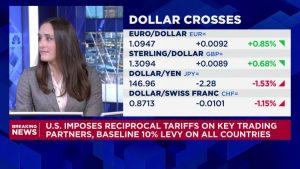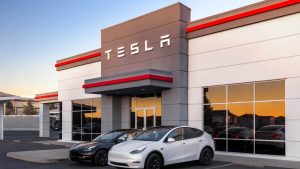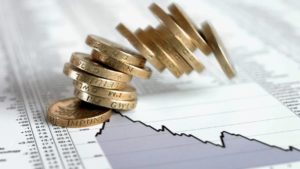Thursday (3 April) wasn’t a good day for most FTSE 100 stocks. Overall, the index closed the day 1.5% lower. Investors didn’t react well to the overnight news that most of America’s trading partners will be subject to additional import taxes on goods entering the US.
Not surprisingly, there were some big fallers.
On the ropes
Standard Chartered was the worst affected. Its shares tanked 12.8% on fears that the bank, with heavy exposure to the Asian economies that face the biggest tariffs, could see a significant drop in earnings. HSBC (down 8.6%) wasn’t far behind.
As a result of a falling oil price, Shell and BP saw their stock prices sink.
JD Sports Fashion is Nike’s number one global partner and, following the acquisition of the Hibbett chain, has a large presence in the US. Most of the American sportswear giant’s products are made in the Far East. Due to tariffs, these will now become much more expensive for American consumers. The British retailer’s shares tumbled 8.1%.
But it wasn’t all bad news.
Becoming defensive
During times of volatility, utilities tend to attract the risk-averse investor.
With the demand for energy unlikely to be affected by import taxes, both SSE and National Grid rose approximately 4%.
Even United Utilities and Severn Trent, two of the largest companies in the UK’s beleaguered water industry, recorded similar gains.
Supermarket stocks did well too. Tesco and J Sainsbury don’t have any stores in the America and sell products that consumers generally buy regardless of global economic conditions.
Broadly speaking, all of these companies have steady and reliable earnings, meaning their share prices should be less volatile. While Trump’s tariffs wreak havoc on global supply chains, these FTSE 100 companies will quietly go about their business.
Quietly impressive
Another stock I think investors could consider during these difficult times is Next (LSE:NXT), the clothing, footwear, and home products retailer. Although it sells some of its products into the US using the Nordstrom platform, this accounts for a relatively small proportion of sales.
And whatever’s thrown at the company – recession, the internet, Brexit, Covid, inflation, high interest rates, and more — it seems to find a way to cope. During the year ended 25 January 2025 (FY25), the company reported a pre-tax profit of £1bn for the first time.
I’m particularly impressed with the way in which the company manages expectations. For FY25, it released four separate profits upgrades. All of them were small (£5m-£20m) but they were enough to please investors.
For FY26, the company’s already announced an increase in its expected profit before tax from £1.046bn to £1.066bn.
But the group faces some challenges. Fashion retailing can be tough. And due to the need to pay rent and rates, operating 457 bricks-and-mortar stores is expensive.
However, Next has managed to embrace the rise of online shopping rather than view it as a threat. Just over half of UK sales come via the internet.
And there’s plenty of scope to replicate its business model overseas, although probably not in the US given the current climate. But above all else, I think it’s a well-managed company that should be able to deal with whatever the present occupant of the White House comes up with next.
This post was originally published on Motley Fool







